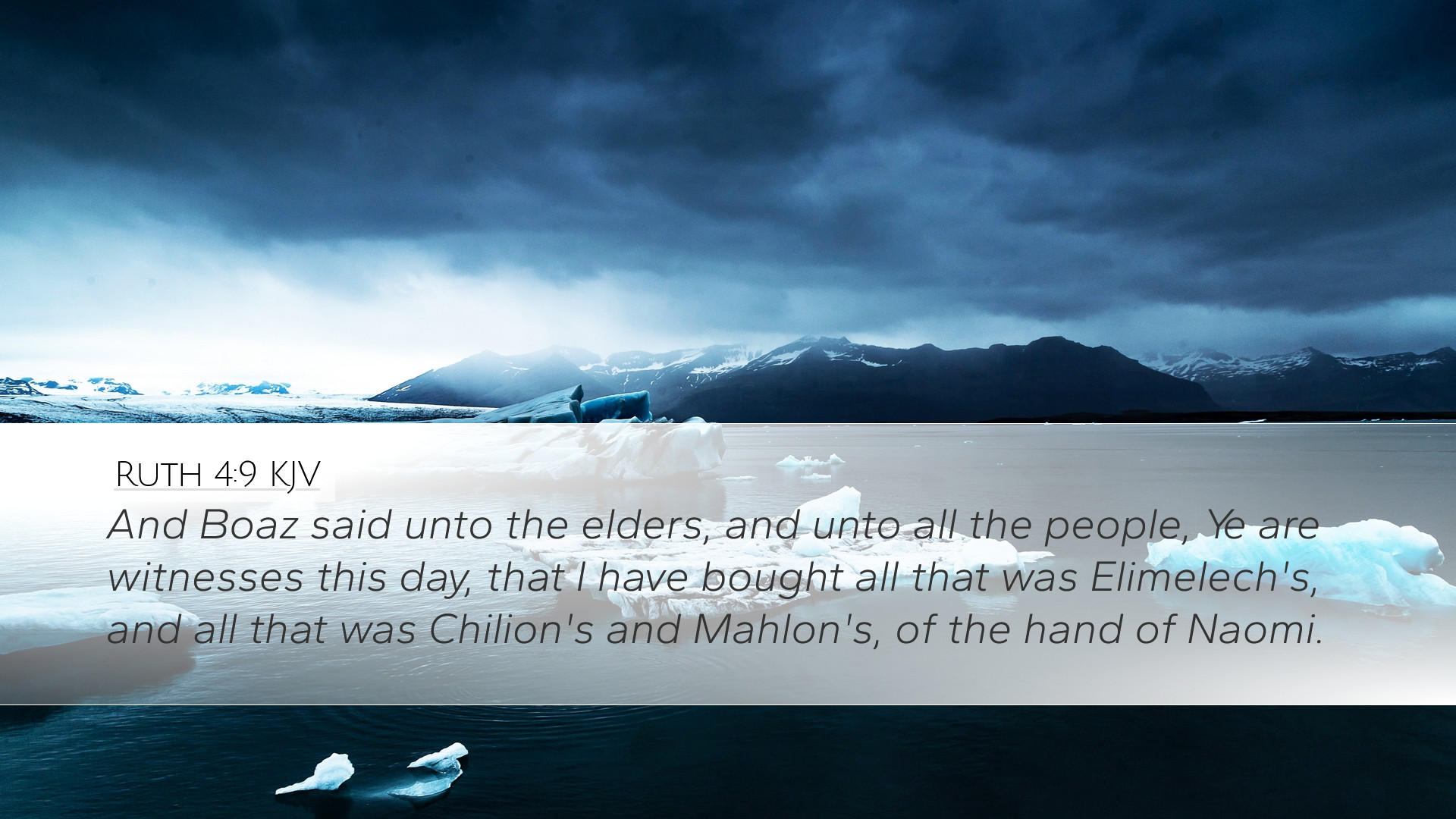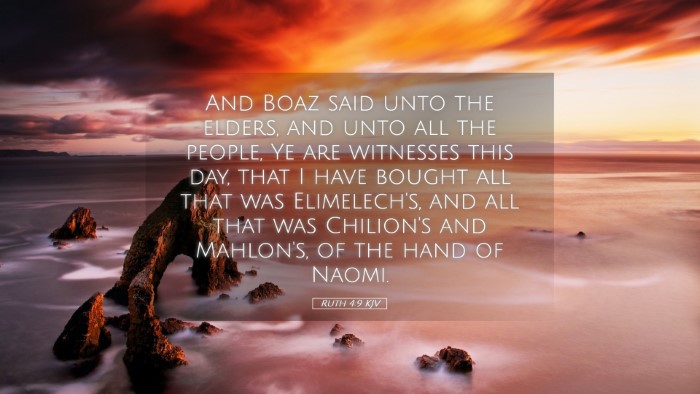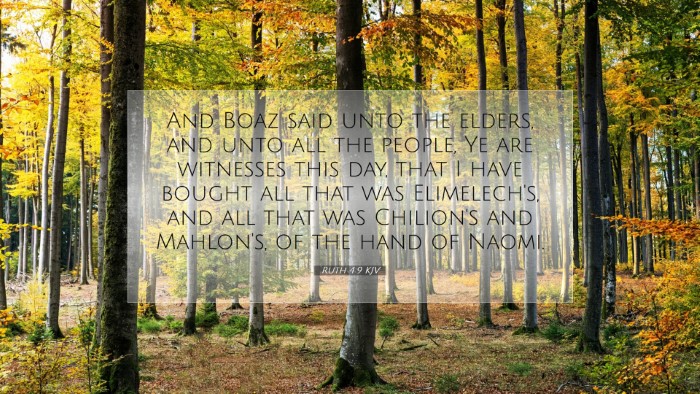Old Testament
Genesis Exodus Leviticus Numbers Deuteronomy Joshua Judges Ruth 1 Samuel 2 Samuel 1 Kings 2 Kings 1 Chronicles 2 Chronicles Ezra Nehemiah Esther Job Psalms Proverbs Ecclesiastes Song of Solomon Isaiah Jeremiah Lamentations Ezekiel Daniel Hosea Joel Amos Obadiah Jonah Micah Nahum Habakkuk Zephaniah Haggai Zechariah MalachiRuth 4:9
Ruth 4:9 KJV
And Boaz said unto the elders, and unto all the people, Ye are witnesses this day, that I have bought all that was Elimelech's, and all that was Chilion's and Mahlon's, of the hand of Naomi.
Ruth 4:9 Bible Commentary
Commentary on Ruth 4:9
Verse Reference: Ruth 4:9 - "And Boaz said to the elders and all the people, 'You are witnesses today that I have bought from the hand of Naomi all that belonged to Elimelech and all that belonged to his sons.'
Introduction
The Book of Ruth, situated within the historical books of the Old Testament, recounts a poignant narrative of loyalty, redemption, and divine providence. Ruth 4:9 marks a significant moment in the culmination of this redemptive story as Boaz declares his acquisition of Naomi's land and his commitment to marry Ruth. This verse encapsulates the themes of kinsman-redeemer, community involvement, and legal formalities.
Contextual Background
Understanding the cultural and historical context of Ruth 4:9 is essential. The story unfolds during the time of the judges in Israel, a period characterized by social upheaval and moral ambiguity. Elimelech, Ruth's deceased father-in-law, had moved his family to Moab during a famine in Bethlehem, which reflects the desperate measures families undertook. Upon his death, the tradition of levirate marriage and the role of the kinsman-redeemer becomes pivotal in redeeming both the family name and their property.
The Role of the Kinsman-Redeemer
According to the law outlined in Deuteronomy 25:5-10, a kinsman-redeemer (goel) had the responsibility to marry his deceased brother's widow to preserve the family line. Boaz exemplifies this role, showcasing not only his obligation but also his willingness to redeem Ruth and Naomi.
- Matthew Henry: Emphasizes that Boaz acts with noble intentions, motivated by love and duty. He acknowledges the existing familial ties and the significance of providing for the widow.
- Albert Barnes: Notes the legal implications of the transaction, understanding that this act is not merely financial but also restores dignity and heritage to Naomi and her family.
- Adam Clarke: Discusses the ceremonial aspect of this public pronouncement, viewing it as a means to maintain openness and integrity within the community.
The Purpose of Boaz's Declaration
Boaz's declaration to the elders and people is not merely a formality but serves multiple important purposes:
- Community Acknowledgment: By making the announcement in the presence of the town elders and the people, Boaz ensures transparency and communal endorsement. This collective recognition not only legitimizes his actions but also fosters a sense of accountability.
- Legal Formality: Boaz is fulfilling the legal requirements of redemption, which requires public witnesses to affirm the transaction. This aligns with the customs of the time, ensuring that future disputes regarding the land and the family line are mitigated.
- Spiritual Implications: Beyond the legal, there are spiritual ramifications. As a kinsman-redeemer, Boaz's actions foreshadow God's redemptive work through Christ, illustrating the divine providence that weaves through the ordinary lives of individuals.
Theological Significance
This verse serves as a focal point in understanding greater theological themes within Scripture.
- Redemption: The act of redeeming Ruth and Naomi speaks to the broader theme of redemption found throughout Scripture. Just as Boaz redeems Ruth from her widowhood and poverty, so God redeems us through Christ, offering salvation and restoration.
- Community and Witness: The involvement of the elders points to the communal aspect of faith. Witnesses play a crucial role in a believer's journey, reinforcing the collective responsibility of the church in upholding justice and mercy.
- Faithfulness and Loyalty: Ruth's journey highlights the significance of faithfulness. Her loyalty to Naomi and subsequent trust in Boaz serve as a testament to the rewards of unwavering faith amid uncertainty.
Lessons for Today
Drawing from Ruth 4:9, several lessons emerge for pastors, theologians, and believers today:
- Embrace the Role of a Redeemer: Just as Boaz acted as kinsman-redeemer, Christians are called to extend grace and seek restoration in the lives of those around them, reflecting Christ's redemptive love.
- Value Community: The importance of community and accountable relationships is underscored in Boaz's declaration. Pastors and church leaders should foster environments where mutual support and witness are prioritized.
- Trust in Divine Providence: Like Ruth, we must trust in God's plan, even when the path forward seems unclear. The narrative reassures believers that God orchestrates events for a greater purpose.
Conclusion
Ruth 4:9 encapsulates a moment of profound significance that extends beyond the narrative of Ruth and Boaz. It reminds readers of God's desire for redemption and the communal responsibility we bear as witnesses to one another's lives. In a world that often overlooks the marginalized, Boaz's actions serve as a clarion call to remain steadfast in faith and committed to love, justice, and redemption.


